|
Back
Joyce Wang Versus the Nutcracker Flowers New York
Avery Fisher Hall, Lincoln Center
07/02/2014 - & July 3*, 2014
Summertime Classics
Dmitri Shostakovich: Festive Overture, Opus 96
Sergei Rachmaninoff: Piano Concerto No. 1 in F-sharp minor, Opus 1 – Vocalise, Opus 34, No. 14
Modest Mussorgsky: Night on Bald Mountain (Arranged by Nicolai Rimsky-Korsakov)
Peter Ilych Tchaikovsky: The Nutcracker, opus 71: Waltz of the Flowers – Marche slave, Opus 31
Joyce Wang (Piano)
New York Philharmonic Orchestra, Bramwell Tovey (Conductor)

J. Wang (© Courtesy of the Artist)
Lurking in the shadows of any concert hall are a few loathsome insects who call themselves music critics, discoursing wisely on Boulez piano sonatas, Byzantine church modes, and Eliiott Carter’s parallel dissonances.
But then...?
Well, then they go home, and–like Philip Roth’s teenager who’d sneak up to the balcony of the movie theater to exercise his prurient desires into a Mounds candy bar–these so-called critics relish the worst music of the Soviet Union, achieving their pleasures from the worst possible kitsch. Yes, I confess to being one of those loathsome insects, shamelessly humming the martial choruses from Prokofiev’s On Guard for War and Shostakovich’s children’s tunes from Song of the Forests.
And falling in love with the initial work on this week’s NY Phil concert.
For the first of the New York Philharmonic “summertime classics”, Canadian conductor Bramwell Tovey opened with a piece of Shostakovich kitsch. And despite what serious biographers say, I doubt if Shosty really minded writing the Festive Overture, marking the 37th Anniversary of the October Revolution. After three long decades under Josef Stalin, he must have been relieved in 1954, to pen the brass fanfares, the popular melodies (he would have made a terrific composer of Broadway musicals), the orchestral choruses and the sure-fire fiery assurances for his audiences.
Despite his problems with Stalin, Shostakovich never ever rejected Communism, and the Festive Overture was doubtless a joy to compose.
As it was a joy for Canadian conductor Bramwell Tovey taking the guest reins of the New York Philharmonic. Mr. Tovey has a jubilant personality, and his mid-program talk was, unlike Alan Gilbert’s more sober introductions, a piece of standup story-telling. (Conductor Tovey affirms he is not a relation of music analyst Donald Tovey, but both evidently are students of vivacious writing and speaking.)
But this was all in the night’s work, for nearly the entire program was built around Russian “easy” music. In fact, the entire “Summer Classics” repertoire is supposed to affirm (in the ill-chosen word of Zarin Mehta), a more “unstuffy concert hall”.
Well, audiences may be stuffy, certain music may be challenging, but to say that Avery Fisher Hall is, during the other three seasons “stuffy” is a rather dismal way for the Executive Director the Phil to look at things.
Anyhow, for this first concert, Nutcracker and Marche Slave fit the bill. They are tuneful, familiar and foot-tapping and Mr. Tovey’s personal geniality was in force here. True, his Night on Bald Mountain was pedestrian, to say the least. But I would suggest that any conductor should play the original Mussorgsky version. It isn’t as neat as the usual Rimsky-Korsakov rewrite, there several structural problems, but the eerie ghastly and mystically Russian music is truly unnerving.
The concert had a single rarity on this program–and for that, most of us were happy to come through the hurricane. The Rachmaninoff First Concerto is almost unknown here. He composed it in university and many years later, he revised it, keeping, so he said, hardly any of the original notes. Yet is hasn’t been heard in New York for nine years, and is hardly familiar.
Joyce Wang, fortunately, is a familiar face here, and her music-playing can be frankly gorgeous. In a way, she transcended the Concerto itself, which resembles the Grieg/Tchaikovsky showpiece, without the inspiration. That was fine in 1890 when it was composed. But the revision was 1917, and the piece shows its age.
Ms. Wang also shows her age, which musically is perpetually youthful. The piece is less than grand, but her fingers seemed to literally dance over the keys. It was gingerly playing, not grand playing. It never was necessary to strike that Russian temperament, and the lovely second movement was more like a luminous Chopin nocturne than a Slavic dream.
Conductor Tovey did little to augment the playing. The grand Russian brass choirs sounded all too American, and the lyrical second theme of the opening was insufferably dragged along. Yes, Rachmaninoff had his sentimental side, but this was close to saccharine.
Still, Ms. Wang kept this First Concerto moving, and in a program of lollipops and sugar-plum fairies, she gave surefire human glitter to her notes.
Harry Rolnick
|